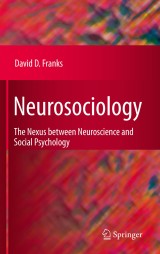Details

Neurosociology
The Nexus Between Neuroscience and Social Psychology|
96,29 € |
|
| Verlag: | Springer |
| Format: | |
| Veröffentl.: | 19.04.2010 |
| ISBN/EAN: | 9781441955319 |
| Sprache: | englisch |
| Anzahl Seiten: | 250 |
Dieses eBook enthält ein Wasserzeichen.
Beschreibungen
As a career sociologist I ?rst became interested in neurosociology around 1987 when a graduate student lent me Michael Gazzaniga’s The Social Brain. Ifthe biological human brain was really social, I thought sociologists and their students should be the ?rst, not the last, to know. As I read on I found little of the clumsy reductionism of the earlier biosociologists whom I had learned to see as the arch- emy of our ?eld. Clearly, reductionism does exist among many neuroscientists. But I also found some things that were very social and quite relevant for sociology. After reading Descarte’s Error by Antonio Damasio, I learned how some types of emotion were necessary for rational thought – a very radical innovation for the long-honored “objective rationalist. ” I started inserting some things about split-brain research into my classes, mispronouncing terms like amygdala and being corrected by my s- dents. That instruction helped me realize how much we professors needed to catch up with our students. I also wrote a review of Leslie Brothers’ Fridays Footprint: How Society Shapes the Human Mind. I thought if she could write so well about social processes maybe I could attempt to do something similar in connection with my ?eld. For several years I found her an e-mail partner with a wonderful sense of humor. She even retrieved copies of her book for the use of my graduate students when I had assigned it for a seminar.
As a career sociologist I ?rst became interested in neurosociology around 1987 when a graduate student lent me Michael Gazzaniga’s The Social Brain. Ifthe biological human brain was really social, I thought sociologists and their students should be the ?rst, not the last, to know. As I read on I found little of the clumsy reductionism of the earlier biosociologists whom I had learned to see as the arch- emy of our ?eld. Clearly, reductionism does exist among many neuroscientists. But I also found some things that were very social and quite relevant for sociology. After reading Descarte’s Error by Antonio Damasio, I learned how some types of emotion were necessary for rational thought – a very radical innovation for the long-honored “objective rationalist. ” I started inserting some things about split-brain research into my classes, mispronouncing terms like amygdala and being corrected by my s- dents. That instruction helped me realize how much we professors needed to catch up with our students. I also wrote a review of Leslie Brothers’ Fridays Footprint: How Society Shapes the Human Mind. I thought if she could write so well about social processes maybe I could attempt to do something similar in connection with my ?eld. For several years I found her an e-mail partner with a wonderful sense of humor. She even retrieved copies of her book for the use of my graduate students when I had assigned it for a seminar.
The Evolution of the Human Brain.- What Is Social About the Human Brain?.- The New Unconscious: Agency and Awareness.- Mirror Neurons: A Return to Pragmatism and Implications for an Embodied Intersubjectivity.- The Neuroscience of Emotion and Its Relation to Cognition.- The Self in Neuroscience and Social Psychology.- Consciousness, Quale, and Subjective Experience.- The Place of Imitation in Social Life and Its Anatomical Brain Supports.- Determinism and Free Will.- Conclusion.
<P>Recently, neuroscientists have presented new research which has a direct impact on many areas of Social Psychology. In this innovative volume, the author explores the nexus of Social Psychology and Neuroscience with relation to:</P>
<P><BR>-The Human "Self"<BR>-The Social Nature of the Mind<BR>-Socialization and Language Acquisition<BR>-Role-Taking/Theory of Mind<BR>-Consciousness<BR>-Intersubjectivity<BR>-Balanced Social Constructionism<BR>-Human Agency<BR>-The Effect of Emotion on Rational Decision-Making </P>
<P></P>
<P>This groundbreaking work integrates areas of George Herbert Mead's social behaviorism with current neuroscience. The chapters in this volume demonstrate how current work on mirror neurons supports the basic tenets of the American pragmatists' focus on the priority of motor behavior. <BR></P>
<P><BR>-The Human "Self"<BR>-The Social Nature of the Mind<BR>-Socialization and Language Acquisition<BR>-Role-Taking/Theory of Mind<BR>-Consciousness<BR>-Intersubjectivity<BR>-Balanced Social Constructionism<BR>-Human Agency<BR>-The Effect of Emotion on Rational Decision-Making </P>
<P></P>
<P>This groundbreaking work integrates areas of George Herbert Mead's social behaviorism with current neuroscience. The chapters in this volume demonstrate how current work on mirror neurons supports the basic tenets of the American pragmatists' focus on the priority of motor behavior. <BR></P>
<p>The first book to approach sociology and neuroscience</p><p>Describes for a sociological audience what neuroscience can add to their research - especially social psychologists</p><p>David Franks is one of the first sociologists to research and publish on this new field of study</p><p>Includes supplementary material: sn.pub/extras</p>

















